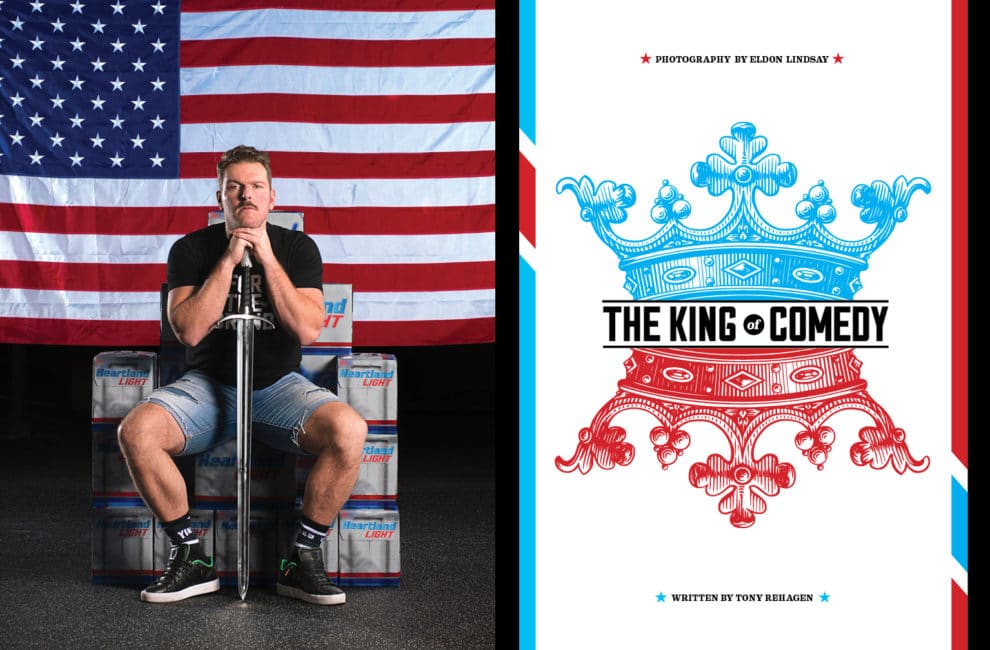
Can Pat McAfee Clean Up Sports Talk Broadcasting?
There’s no signage on the Barstool Heartland headquarters, just north of the Central Library on Meridian Street—only a street number on the window above the entrance. Mirrored, one-way glass lines the single-story limestone facade and deflects the gaze of any prying eyes. There is no walk-up recording studio, no bright marquee, no street-side speakers blaring, no old-school towers or antennae casting shadows from the roof. There is nothing to alert passersby, be they fans or would-be protesters, that this is an outpost of one of the loudest, brashest, and most controversial networks in national sports talk media.
The inconspicuousness of the building is more a result of tenants who moved in less than five months ago than of any security concerns. These days, the backlash and vitriol that bubbles up in an increasingly politicized sports sphere is relegated to the internet, where it festers in the dark alleys of anonymity. If the simple storefront is indicative of anything, it might be the straightforward, no-frills attitude of its occupants. And if anyone, be it a disgruntled listener, a neighbor bearing doughnuts, or just a fan, lingers outside searching for a call button long enough to get noticed, the star and namesake of The Pat McAfee Show will often answer the door himself.

The humor is decidedly R-rated. But the jokes rarely stray into the misogynistic territory that has occasionally brought scandal to the Barstool parent company. “Not everything there is my style of comedy,” McAfee says.Photo by Eldon Lindsay
This direct approach shouldn’t surprise anyone who knows Pat McAfee—and in Indy, everyone knows him. He’s the former Colt, the two-time All-Pro punter, kickoff man, and place-kick holder who broke out of the social constraints of his low-rung position to steal the postgame spotlight with honest and hilarious soundbites. He’s the everyman who, upon getting soused and then discovered, suspiciously shirtless and wet, near the Broad Ripple canal by police in 2010, owned his mistake and publicly apologized to his family, teammates, and fans, pledging to earn back the trust of a city that consequently seemed to only love him all the more. He’s the guy who came to like the place so much that he convinced the brass at Barstool Sports corporate to let him set up his post-football business venture—The Pat McAfee Show podcast, its offshoot Heartland Radio, along with both brands’ blogs and YouTube channels—just outside the Mile Square when all of the other Barstool programming and personnel have been forced to uproot and move to HQ in Manhattan. “I didn’t want the people who had followed me and bought my jersey to ever think I was leaving them,” McAfee says. “There was no way I could leave Indy. I owed this place.”
Through Barstool Heartland, McAfee has done more than just bring a national entertainment brand to Indianapolis. In a way, he has also brought a much-needed Midwestern sensibility to an East Coast company that at times gets mired in its own muck. Barstool started in Boston as an “unfiltered and irreverent” forum for sports and bro banter, with bits speculating about the size of Tom Brady’s baby’s penis (including posting a paparazzi photo of the 18-month-old naked on the beach) and a dissertation on bringing back into vogue a derogatory term for women that rhymes with “punt.” Despite its vulgarity and straight-up misogyny, and perhaps because of it, Barstool grew into a network of blogs and pods in cities from Chicago to New York to Philadelphia before being acquired by The Chernin Group in 2016, at an estimated valuation of $10 million to $15 million—a range that Barstool claims has since quadrupled. There have been setbacks, most notably a recent partnership with ESPN for a 30-minute talk show that fell through after a single episode due to what John Skipper, then-president of the network, termed an inability to “distance ourselves from the Barstool site and its content.” Reports pointed to internal resistance from ESPN broadcasters who had been targeted by Barstool rants themselves—for instance, one calling female reporter Sam Ponder a “f—king slut” who should “sex it up and be slutty” on the air.
“My mom would beat my ass if I was ever to do anything that disrespected women.”
“Not everything there is my style of comedy,” says McAfee. While he says he respects what other Barstool voices do, McAfee’s comedy has always been observational, based mostly on his exploits as an ex-pro athlete. That’s not to say his routine is PG, or even PG-13. McAfee will talk a blue streak that would make the bouncer at a biker bar blush, but he tends to stop short of racist, homophobic, or sexist remarks. “My mom would beat my ass if I was ever to do anything that disrespected women,” he says.
“Pat is less cynical [than the other Barstool voices],” says Dave Portnoy, founder and spiritual leader of Barstool. “He’s more about everybody laughing together as opposed to making fun. He genuinely likes everybody. Maybe that’s a Midwestern thing.”
One year since it launched from McAfee’s basement, The Pat McAfee Show is Barstool’s fastest-growing podcast—a sign that the host’s “Midwestern thing” is finding an audience among the macho masses across the country. Improbably, the guy who was once arrested drunk, shirtless, and drenched in duck-crap-tainted water might actually be classing up the joint.







